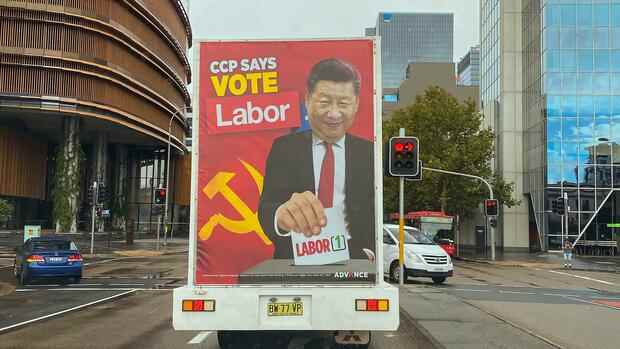Bangkok The most conspicuous poster in Australia’s election campaign shows a foreign head of state rather than a candidate. You can see China’s President Xi Jinping throwing a ballot into the ballot box with a wry smile. “The Communist Party Says: Vote for Labor” is written above the photo montage. A conservative lobby group paid for the campaign. It is to be understood as an unmistakable warning: If there is a Labor victory in the parliamentary elections on Saturday, then that will also be a victory for China, is the message.
Fears of China’s growing influence in the Pacific have been a key issue in recent weeks ahead of the vote in which Australians will decide Prime Minister Scott Morrison’s political future. During the election campaign, the conservative leader of the Liberal-National government coalition tried to score with tough rhetoric against the People’s Republic – his defense minister even demanded that Australia “prepare for a war to secure the peace”. But despite widespread China skepticism among the population, polls show that Morrison is facing defeat.
The government in Beijing also has a stake in the prime minister’s election campaign problems. A month before the election, she had signed a secretly negotiated security agreement with the island nation of Solomon Islands in Australia’s immediate vicinity.
According to Western governments, the cooperation could enable the Chinese People’s Army to station troops in the South Pacific. Morrison was taken by surprise. In the middle of the election campaign, the agreement scratched its self-portrayal as a guarantor of Australia’s security.
Top jobs of the day
Find the best jobs now and
be notified by email.
The opposition used the target: Anthony Albanese, head of the Social Democratic Labor Party and Morrison’s possible successor as prime minister, accused the government in Canberra of “massive foreign policy failure”. In his view, Morrison could have done more to nurture once-close ties with the Solomon Islands and thwarted the cooperation deal with China off Australia’s coast.
Disputes over Huawei and Corona strain relations with the People’s Republic
Morrison denied the allegations. However, the government admitted that the development was politically damaging. Home Secretary Karen Andrews suggested China intentionally signed the pact during Australia’s election campaign in order to influence the vote. Morrison joined the speculation without providing any evidence: “We are very aware of the influence that the Chinese government wants to exert in this country,” he said.
Dealing with China moves Australia’s people like no other election. According to a survey of 2,000 Australians by UTS University, 40 percent see China policy as an important factor in their voting decision. The vast majority of this group say they do not trust the government in Beijing.
Pre-voting is possible in Sydney. All polling stations open on Saturday.
(Photo: Reuters)
Australia’s relationship with China has deteriorated rapidly under Morrison. In 2018, when he was still a minister in the previous government, he excluded the Chinese companies Huawei and ZTE from participating in the construction of the 5G mobile network. At the time, Australia was the first country to distance itself so clearly from Chinese technology companies, which the government in Beijing branded as discrimination. In 2020, Morrison drew China’s ire again after his aggressive push for clarifying the origins of the coronavirus in Wuhan. China responded with a series of new tariffs and trade barriers on Australian exports.
Military agreement with the USA and Great Britain meets with sharp criticism from China
Along with the United States and Britain, Morrison signed the Aukus Security Pact last year, under which Australia is to be equipped with nuclear-powered submarines – with the aim of counterbalancing China’s growing military power in the Pacific. The government in Beijing criticized the project as “extremely irresponsible”. The tense situation between the two countries became clear again last week when Defense Minister Peter Dutton appeared before the press to warn of a Chinese warship that had been sighted off Australia’s coast. “I think that’s an aggressive act,” he said.
Dutton is known for his particularly strong criticism of China. He has repeatedly compared Beijing’s ambitions with those of the Nazis in the 1930s. Should the Morrison government now be voted out of office, as pollsters expect, this could contribute to a change in sentiment. “Of course, a change of government would fundamentally offer potential for improving bilateral relations,” says Patrick Köllner, director of the Hamburg Giga Institute for Asian Studies. It is true that there are no major differences between the opposition and the government in the substance of China policy. “But the tone could be different,” says Köllner.
He expects “a less wide-legged appearance and less megafon diplomacy”. However, he holds the government in Beijing primarily responsible for improving relations between the two countries. According to Australian information, she has been blocking bilateral talks at senior government level since 2020. “The ball is in China,” says Köllner.
More: In this way, the German government spoils an important arms deal in China
